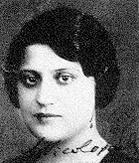Dido Sotiriou
| Dido Sotiriou | |
|---|---|
 |
|
| Born |
18 February 1909 Aydin, Ottoman Empire |
| Died | 23 September 2004 (aged 95) Athens, Greece |
| Occupation | Novelist, journalist, and playwright |
| Nationality | Ottoman, Greek |
Dido Sotiriou (née Pappa; alternative spelling: Dido Sotiriu; Greek: Διδώ Σωτηρίου, Turkish: Dido Sotiroğlu; 18 February 1909 – 23 September 2004) was a Greek novelist, journalist, and playwright.
Sotiriou was born in Aydin, in western Anatolia and at that time part of the Ottoman Empire, as the daughter of Evangelos Pappas and Marianthi Papadopoulou, in a wealthy and polyglot bourgeois Rûm family who lived in a stately home. Her childhood, Sotiriou said, appeared to her as an "endless fairy tale". She had two older and two younger siblings. After her father, an entrepreneur, went bankrupt and her family became poor, Dido, who at that time was about eight years old, was sent to her wealthy uncle and his wife in Athens, where later she was educated. Sotiriou later described this separation from her family as "my first experience as a refugee". In 1919 the family moved to Smyrna (now Izmir), at that time occupied by Greece, but in 1922 Turkey repulsed the Greek invasion of Asia Minor (Greek-Turkish War), and Sotiriou's family had to leave Smyrna because of the Greek-Turkish population exchange.
The family landed in the port of Piraeus, where the father worked in the docks and on ships as a clerk. In Athens, she was raised in her aunt's house in the affluent, middle-class milieu. There she completed her studies, attending the French Institute and having as teachers Kostas Paroritis and Sophia Mavroeidis-Papadakis, and later attending the Sorbonne. However, as she herself explained, she developed in that period a strong sense of social justice, especially because of the contrast between her own privileged situation and the humble way of living of her parents and siblings. She became a member of the union and so came to the leftist movement. In 1933 she joined the anti-fascist front. In 1935 she met in Geneva Vladimir Lenin’s comrade Alexandra Kollontai and in 1945 she was cofounder of the Women’s International Democratic Federation in Paris. In 1936 she began her career as a journalist. She fought against the dictatorship of Ioannis Metaxas and later, in the period of Axis occupation, she joined the Communist Party of Greece and worked for an underground anti-fascist newspaper.
...
Wikipedia
